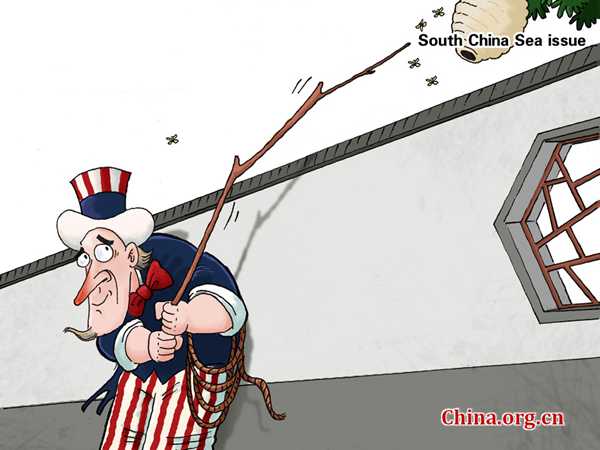Why Philippines expects China to attend APEC 2015
- By Zhang Jingwei
 0 Comment(s)
0 Comment(s) Print
Print E-mail China.org.cn, November 17, 2015
E-mail China.org.cn, November 17, 2015
|
|
|
The trouble maker [By Zhai Haijun/China.org.cn] |
As the host country for the Asia-Pacific Economic Cooperation (APEC) Summit 2015, the Philippines anxiously awaited confirmation of Chinese President Xi Jinping's attendance. There are several reasons for this.
Firstly, all other APEC members, including the United States and Russia, have confirmed their leaders' attendance. It would be a pity if China did not follow suit.
Secondly, the Philippines is vying with China over the South China Sea territorial issue. In 2013, Manila filed its case with the Hague-based Permanent Court of Arbitration, which intensified the conflict. The Philippines always attempts to internationalize and complicate what should be a bilateral issue.
Thirdly, Chinese leaders have been engaged in frequent diplomatic visits in recent months. From Oct. 31 to Nov. 2, Premier Li Keqiang visited South Korea, and attended the sixth meeting of leaders from China, the Republic of Korea (ROK) and Japan on Nov.1; this had been suspended for the past three years. From Nov. 5 to 7, Chinese President Xi Jinping paid state visits to Vietnam and Singapore, and met Taiwan's leader Ma Ying-jeou in the latter on Nov. 7. Some observers thought China was trying to separate Vietnam from the Philippines, and so would not attend this year's APEC Summit to express its discontent about the latter's stand on the South China Sea issue.
However, that showed serious misunderstanding of China. Although tensions in the South China Sea have severely affected China-U.S. ties, the communication between the military of the two sides has been strengthened. On Nov. 4, for example, elements of the two navies conducted a first-ever joint military exercise in the Atlantic Ocean.
This is similar to Sino-Japan relations. China and Japan face not only a history plagued by war, but also a dispute over ownership of the Diaoyu Islands. Yet, bilateral relations have kept moving forward in recent years.




Go to Forum >>0 Comment(s)